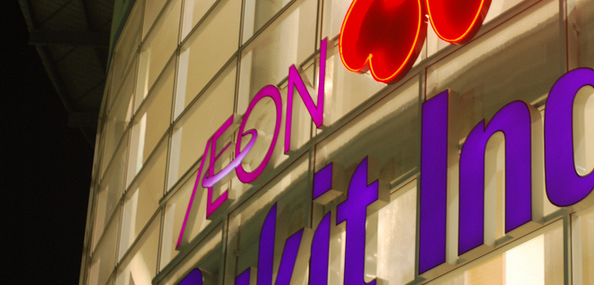This month Carrefour completed its exit from South East Asia. Following the 2010 sale of its Thai business and the closure of Singapore earlier this year; the transfer of the Malaysian business to Japan’s Aeon group and the sale of its remaining holdings in Indonesia last week closes a chapter in South East Asia retail.Â
I doubt many manufacturers will rue the loss of this often difficult trading ‘partner’ in the region and I’m fairly certain that there will be many sales teams breathing a sigh of relief that they won’t have to face another round of annual terms negotiations with Carrefour in the coming months.
Early celebrations may be uncalled for however, particularly in Malaysia. Carrefour’s new operator there, Japanese retail giant Aeon, has been established in Malaysia since 1984. Starting out as a high-end player under the Jusco brand, more recently the group has expanded into multiple formats and online and has ditched the Jusco branding in favor of Aeon for its shopping center and wellness offers whilst developing the Max-value discount brand. The acquisition of Carrefour will enable Aeon to strengthen their position in the market and extend their offer further. It will also create some interesting trade terms discussions.
What does this mean?
One manager recently characterized the situation this way; “We are worried, Carrefour is our least profitable customer in Malaysia and Aeon is our most profitableâ€. I suspect this will be true for many: Aeon has often been seen as the ‘good cop’ operator to Carrefour’s bullying ‘bad cop’. Many manufacturers have seen terms escalate with Carrefour dramatically despite only being fourth in the market. So with Aeon taking over shortly, there is cause for concern.
Regional observers should know what to expect as Carrefour’s sale in Thailand has already created a case study: when Casino acquired Carrefour at the end of 2010, they were able to compare terms. At the time Casino was the larger of the pair and used their understanding of terms to Carrefour to extrapolate what would be ‘fair’ on a larger business base. For many manufacturers this lead to higher levels of investment for no net change in business base and lower margins overall!
Were Aeon to put aside it’s ‘play fair’ approach it could easily secure Carrefour’s level of trade terms across the total business base and legitimately demand more – a conundrum for manufacturers indeed! I would therefore hope that Malaysian key accounts terms have been pressed into action. If not here’s four things they should start doing now:
Establish the risk – Before entering panic mode, it’s really important to clear understand whether or not there is an imbalance in terms between the two companies and if there is to ensure there is a degree of defensibility in the disparity. Where disparity does exist evaluating the upside and downside risk is a must.
Develop a clear plan – Aeon is about to become a bigger, more important player with new stores and with developing store concepts. This is likely to re-invigorate the lulling hypermarket sector in Malaysia and may press other competitors to become more aggressive. All of which should be viewed as an opportunity to enhance sales of brands where big-box retail is important. Plans should consider how the likely disruption in the supply chain will be managed as well as how to harness growth opportunities. Plan for competitor’s responses too, during the Thai transition, Tesco promoted heavily to grab shoppers. Now is the time to redefine customer priorities and re-write business plans to reflect the new reality. These plans will equip teams negotiating with Aeon and others.
Prepare terms negotiations carefully – it’s tough to get terms back from a key retailer so a slip now will cost money in the future. I believe that in these situations companies should press for a ‘start from zero’ approach and develop a new terms deal from the bottom up, based on a clear plan to drive growth and increase efficiency. In the very worst case every potential concession should be carefully evaluated and tied to the execution of activities which are proven to drive sales or save costs. Beware Aeon’s competitors as well, like circling sharks they will smell blood in the water and may use this as an opportunity to seek greater concessions.
Seek help – most key accounts teams will not have had the experience of negotiating these types of deals in the past. This is where regional or global teams can help and support and where those who were involved in negotiations in Thailand in 2010/2011 can add value too. If this level of support isn’t available easily, then contact engage in Malaysia, we will be holding a workshop on this in mid-December to support Malaysian managers and can provide specialist expert support in the market.
All of this may seem very “Malaysia†focused but I believe there are significant regional implications in this. In every market and across every market there will be disparities in trade terms which present real business risks as retail in the region continues to consolidate. In the first decade of the century (according to Nielsen) ‘organized’ retail’s share of FMCG sales in Asia grew from 35% to 57%. In many markets consolidation is far from peak potential levels so we can expect more acquisitions in the future. This being the case manufacturers should take this opportunity to recognize the potential implications of consolidation and act definitively to protect future profitability across Asia.
